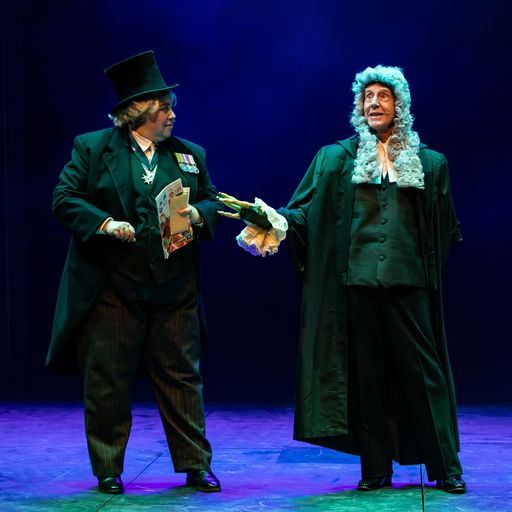Book by Blake Erickson and Jay James-Moody. Music and Lyrics by Laura Murphy. Conceived and directed by Jay James-Moody. Produced by Squabbalogic and Watershed. Seymour Centre, Sydney. September 5 – October 21, 2023
Reviewed : 8 September, 2023

What’s the best style to use for a play about an historical event? A relatively recent historical event. A political event. An event that was controversial, divisive, involving two proud, political leaders, a Governor General, pushy politicians, even an unscrupulous entrepreneur.
Opera perhaps? Melodrama?
Blake Erickson and Jay James-Moody decided on musical comedy, “very serious musical comedy” to capture the big moments and big characters that led to the event in November 1975 that Australian history has called “The Dismissal”. They’ve been fair in their re-telling, making it colourful and bright – and finding humour in their satirical interpretation of the characters and their controversial “wheeling and dealing”.
Choosing to use the character of Norman Gunston, created originally by Gary McDonald, to narrate the saga was a veritable stroke of genius. It sets the tenor for the production – and Matthew Whittet does a brilliant job of recreating Gunston, the awkward, uncouth ‘journalist’ who disconcerted politicians and celebrities alike with his embarrassing questions and gauche style. Whittet is a constant in the production, cleverly incorporating Gunston’s seeming awkwardness into smooth, fast dialogue that moves the production through conservative post war Australia into the progressive1970s.

James-Moody is a clever director whose work is always carefully considered and creatively effective. With a cast of only fifteen, he manages to cover thirteen major characters and an ensemble of politicians and citizens. They make swift character and costume changes, keeping the pace and continuity fast. In portraying the characters, he wisely concentrates on implication rather than imitation ensuring that the colourful political figures are recognisable but not replications.
Characters like Gough Whitlam and John Kerr for instance, were ‘big’ characters, who are still often sited or quoted, so portrayal of them could lead to imitative caricature. But Justin Smith and Octavia Barron Martin make the characters their own, without losing the impact of their power and presence … and their frailties.
Smith plays Whitlam as confident and elegant, head high, stance firm, gestures studied, voice controlled and authoritative. He also shows an arrogance that does not allow his Gough to admit the possibility of failure. Whitlam and his wife Margaret always presented as a team, and Brittanie Shipway’s Margaret isa constant in the production, by Gough’s side, listening, advising, supporting.
Barron-Martin hides Kerr under a white coiffured wig, using shifty eyes and nervous movement to suggest his thwarted ambition and gullibility. He succumbs to the flattery and bullying of his new wife, Anne, played with inveigling smarm by Stacey Thomsett … and to the devious manoeuvring of Sir Garfield Barwick.
Historically regarded as the “influencer” who manipulated John Kerr, Barwick is played by the very skilled and experienced Peter Carroll. In a judge’s wig and gown, but with the long, clawed fingers of the Grim Reaper, Carroll creeps behind Kerr, weaving around him, forever in his ear, whispering, suggesting, prodding. The character is a cleverly written interpretation of the manipulation that occurs when egos and ambition are involved – and Carroll plays it perfectly.
Andrew Cutcliffe plays the conservative leader Malcolm Fraser. Cutcliffe stands tall, sweeping across the stage, impervious and unyielding, cunningly cajoling his party of “private schoolboys” to support his Machiavellian plan.
Joe Kosky is Treasurer Jim Cairns – sorry! Dr Jim Cairns – who convinces the Minister for Minerals and Energy Rex Connor (Georgie Bolton), to borrow money from the Middle East via Pakistani banker Tirath Khemlani played by Monique Sallé. This is a pivotal part of the story and is skilfully retold.

Kosky’s Cairns, tall and broad-shouldered, hovers over Bolton’s shorter, anxious Connor – while Sallé flits deviously between them. Cairns’ assistant – and lover – Junie Morosi, is played by Shannen Alyce Quan. In flares and a fringed vest she typifies the ‘hippie’ influence of the 70s.
Monique Sallé also plays a dejected, rejected Billy Snedden – and an unamused Queen Elizabeth II, remote in England but kept aware of what is happening “down under”.
When not involved in the action as these characters, they join ensemble actors Lincoln Elliott, Kaori Maeda-Judge, Quinton Rofail Rich and Anusha Thomas as citizens or voters or politicians in the jazzy dance routines choreographed in her inimitable style by Amy Campbell. Laura Murphy’s 70s style music is played by the orchestra led by Mark Chamberlain.

Set and costume designers Charles Davis and Emma White use a moving tiered rostrum and desks and chairs on wheels to allow offices, living rooms – and thrones – to be imagined. Changing dates and events appear on ticker-tape style sur-titles. It was a vibrant time for fashion and Davis and White have had fun with costumes. So many memories swirl. Flashes of orange, yellow and green; tartans and jackets with piped edges; short skirts and flared trousers.
Whether this musical will endure beyond the 65+ audiences that lived through The Dismissal remains to be seen, but for those who still “maintain the rage” and those who gave Malcom Fraser his time in The Lodge, Blake Erickson and Jay James-Moody have revived the event with heart rather than hurt, satire rather than cynicism.